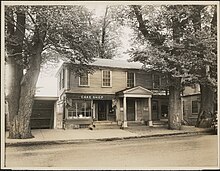The Continental Congress was a series of legislative bodies, with some executive function, for the Thirteen Colonies of Great Britain in North America, and the newly declared United States before, during, and after the American Revolutionary War. The Continental Congress refers to both the First and Second Congresses of 1774–1781 and at the time, also described the Congress of the Confederation of 1781–1789. The Confederation Congress operated as the first federal government until being replaced following ratification of the U.S. Constitution. Until 1785, the Congress met predominantly at what is today Independence Hall in Philadelphia, though it was relocated temporarily on several occasions during the Revolutionary War and the fall of Philadelphia.

Timeline of the American Revolution—timeline of the political upheaval culminating in the 18th century in which Thirteen Colonies in North America joined together for independence from the British Empire, and after victory in the Revolutionary War combined to form the United States of America. The American Revolution includes political, social, and military aspects. The revolutionary era is generally considered to have begun with the passage of the Stamp Act in 1765 and ended with the ratification of the United States Bill of Rights in 1791. The military phase of the revolution, the American Revolutionary War, lasted from 1775 to 1783.

The Intolerable Acts, sometimes referred to as the Insufferable Acts or Coercive Acts, were a series of five punitive laws passed by the British Parliament in 1774 after the Boston Tea Party. The laws aimed to punish Massachusetts colonists for their defiance in the Tea Party protest of the Tea Act, a tax measure enacted by Parliament in May 1773. In Great Britain, these laws were referred to as the Coercive Acts. They were a key development leading to the outbreak of the American Revolutionary War in April 1775.
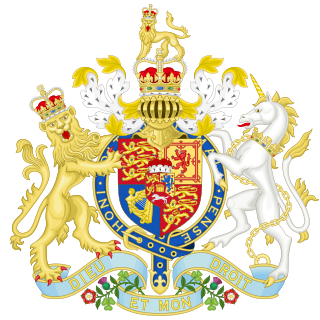
The Administration of Justice Act, or An Act for the Impartial Administration of Justice, also popularly called the Monkey Act and the Murder Act by George Washington, was an Act of the Parliament of Great Britain. It covered the treatment of British officials in the Massachusetts Bay colony and became law on 20 May 1774.

The Second Continental Congress was the late 18th-century meeting of delegates from the Thirteen Colonies that united in support of the American Revolution and the Revolutionary War, which established American independence from the British Empire. The Congress constituted a new federation that it first named the United Colonies of North America, and in 1776, renamed the United States of America. The Congress began convening in Philadelphia, on May 10, 1775, with representatives from 12 of the 13 colonies, after the Battles of Lexington and Concord.

The Province of Massachusetts Bay was a colony in New England which became one of the thirteen original states of the United States. It was chartered on October 7, 1691, by William III and Mary II, the joint monarchs of the kingdoms of England, Scotland, and Ireland, and was based in the merging of several earlier British colonies in New England. The charter took effect on May 14, 1692, and included the Massachusetts Bay Colony, the Plymouth Colony, the Province of Maine, Martha's Vineyard, Nantucket, Nova Scotia, and New Brunswick; the Commonwealth of Massachusetts is the direct successor. Maine has been a separate state since 1820, and Nova Scotia and New Brunswick are now Canadian provinces, having been part of the colony only until 1697.
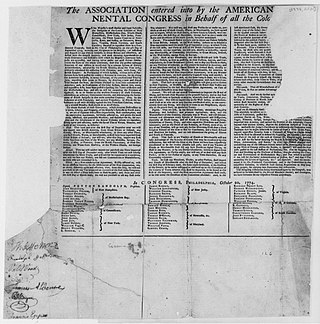
The Continental Association, also known as the Articles of Association or simply the Association, was an agreement among the American colonies adopted by the First Continental Congress in Philadelphia on October 20, 1774. It was a result of the escalating American Revolution and called for a trade boycott against British merchants by the colonies. Congress hoped that placing economic sanctions on British imports and exports would pressure Parliament into addressing the colonies' grievances, especially repealing the Intolerable Acts, which were strongly opposed by the colonies.

The First Continental Congress was a meeting of delegates of 12 of the Thirteen Colonies held from September 5 to October 26, 1774, at Carpenters' Hall in Philadelphia at the beginning of the American Revolution. The meeting was organized by the delegates after the British Navy implemented a blockade of Boston Harbor and the Parliament of Great Britain passed the punitive Intolerable Acts in response to the Boston Tea Party.
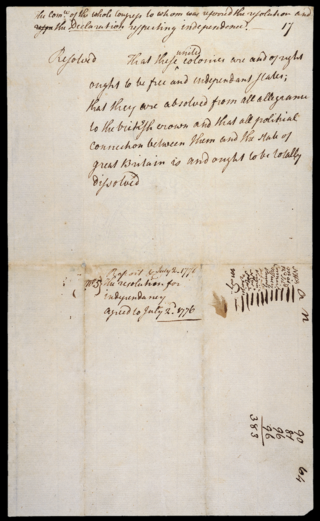
The Lee Resolution, also known as "The Resolution for Independence", was the formal assertion passed by the Second Continental Congress on July 2, 1776, resolving that the Thirteen Colonies were "free and independent States" and separate from the British Empire. This created what became the United States of America, and news of the act was published that evening in The Pennsylvania Evening Post and the following day in The Pennsylvania Gazette. The Declaration of Independence, which officially announced and explained the case for independence, was approved two days later, on July 4, 1776.
The Orangetown Resolutions were adopted on July 4, 1774, exactly two years prior to the adoption of the United States Declaration of Independence. The resolutions were part of a widespread movement of town and county protests of the Intolerable Acts passed by the British Parliament in 1774.
The Fairfax Resolves were a set of resolutions adopted by a committee in Fairfax County in the Colony of Virginia on July 18, 1774, in the early stages of the American Revolution. Written at the behest of George Washington and others, they were authored primarily by George Mason. The resolutions rejected the British Parliament's claim of supreme authority over the American colonies. More than thirty counties in Virginia passed similar resolutions in 1774, "but the Fairfax Resolves were the most detailed, the most influential, and the most radical."
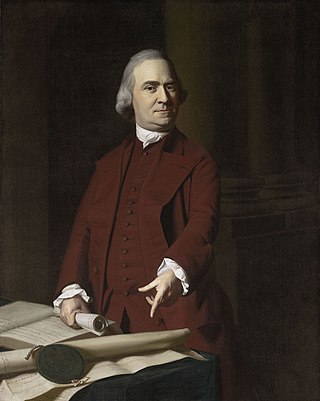
Samuel Adams was an American statesman, political philosopher, and a Founding Father of the United States. He was a politician in colonial Massachusetts, a leader of the movement that became the American Revolution, a signatory of the Declaration of Independence and other founding documents, and one of the architects of the principles of American republicanism that shaped the political culture of the United States. He was a second cousin to his fellow Founding Father, President John Adams.

The Massachusetts Provincial Congress (1774–1780) was a provisional government created in the Province of Massachusetts Bay early in the American Revolution. Based on the terms of the colonial charter, it exercised de facto control over the rebellious portions of the province, and after the British withdrawal from Boston in March 1776, the entire province. When Massachusetts Bay declared its independence in 1776, the Congress continued to govern under this arrangement for several years. Increasing calls for constitutional change led to a failed proposal for a constitution produced by the Congress in 1778, and then a successful constitutional convention that produced a constitution for the state in 1780. The Provincial Congress came to an end with elections in October 1780.

The Declaration and Resolves of the First Continental Congress was a statement adopted by the First Continental Congress on October 14, 1774, in response to the Intolerable Acts passed by the British Parliament. The Declaration outlined colonial objections to the Intolerable Acts, listed a colonial bill of rights, and provided a detailed list of grievances. It was similar to the Declaration of Rights and Grievances, passed by the Stamp Act Congress a decade earlier.

The Petition to the King was a petition sent to King George III by the First Continental Congress in 1774, calling for the repeal of the Intolerable Acts. The King's rejection of the Petition, was one of the causes of the later United States Declaration of Independence and American Revolutionary War. The Continental Congress had hoped to resolve conflict without a war.

The 27 grievances is a section from the United States Declaration of Independence. The Second Continental Congress's Committee of Five drafted the document listing their grievances with the actions and decisions of King George III with regard to the colonies in North America. The Second Continental Congress voted unanimously to adopt and issue the Declaration of Independence on July 4, 1776.
The Augusta Resolves was a statement adopted on February 22, 1775 by six representatives of Augusta County, Colony of Virginia, in the early stages of the American Revolution. The resolves expressed support for Congress' resistance to the Intolerable Acts, issued in 1774 by the British Parliament, and a commitment to risk 'lives and fortune' in preservation of natural rights.

The town of Dedham, Massachusetts, participated in the American Revolutionary War and the protests and actions that led up to it in a number of ways. The town protested the Stamp Act and then celebrated its repeal by erecting the Pillar of Liberty. Townsmen joined in the boycott of British goods following the Townshend Acts, and they supported the Boston Tea Party. Dedham's Woodward Tavern was the site where the Suffolk Resolves gathering was first convened.
The Loudoun Resolves was a resolution adopted by a committee in Loudoun County in the colony of Virginia on June 14, 1774, during the very early stages of the American Revolution. It was the one of the earliest public declarations objecting to the Intolerable Acts, passed by Parliament to punish Massachusetts Colonists for conducting and supporting the Boston Tea Party. The Loudoun Resolves also was the first colonial document implying its signers would employ force in resisting Britain's use of military power to implement the Acts, which it declared would cause a civil war. Loudoun colonists at the same time declared a boycott of all East India Company products and an end to commerce with England until the Boston Port Act, the first of the Intolerable Acts, was repealed and Parliament abandoned political control of its North American colonies.

The Talbot Resolves was a proclamation made by Talbot County citizens of the British Province of Maryland, on May 24, 1774. The British Parliament had decided to blockade Boston Harbor as punishment for a protest against taxes on tea. The protest became known as the Boston Tea Party. The Talbot Resolves was a statement of support for the city of Boston in the Province of Massachusetts Bay.


